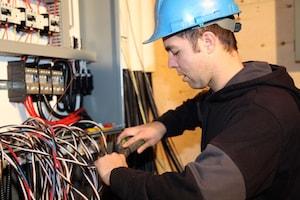Electrical Injuries

On construction sites electricity poses a unique hazard to construction workers – unlike other dangers, electricity cannot be seen, heard, or smelled. Electricity can only be felt, and by the time that electricity is felt, it is too late to protect oneself from harm. Although electricity can cause many different types of injuries, the three types of injuries that most commonly occur on construction sites are the following:
- death by electrocution or severe internal and/or external burns through inadvertent contact with high voltage lines or equipment;
- severe burns or death from explosive gases inadvertently ignited by electrical equipment; and
- various injuries from falls or from contact with moving equipment that occurs after a worker experiences a low voltage electrical shock and can no longer safely maintain his/her balance or physical control of the tools or equipment that he or she was manipulating when shocked.
The Department of Labor and Industries [DLI] has enacted many different safety and health regulations concerning electricity. The general requirements applicable to construction work – which all contractors must follow — are set forth in great detail in the Washington Administrative Code, in which all safety and health regulations promulgated by the Washington Industrial Safety and Health Act are officially published. The electrical regulations for construction work are located at WAC 296-155-438.
Employers are required to inspect each job site, look for, and identify potential electrical hazards before allowing workers onto the job site. A few of the most important things that contractors must do to protect their construction workers are the following:
- never allow any worker other than qualified electricians to work on energized electrical systems;
- denergize high voltage lines if possible, and if that is not possible, use barricades or other means to ensure that workers (and any conductive materials the workers may be touching) stay at least 10 feet away from the energized lines at all times;
- make certain that low voltage electrical systems are completely insulated and grounded before allow any worker other than qualified electricians to work near those systems;
- make certain that all power cords are intact and secured in a manner such that they will not come in contact with liquids or be cut, pulled, yanked, or tripped over while in use;
- not allow any electrical devices to be operated in areas where there is flammable or ignitable gas, vapor, liquids, dust, or fibers; and
- lock out and post with warning signs all low and high voltage fuse boxes and control panels so that only qualified personnel can gain access to them.
Electrical injuries can happen on construction sites anywhere in Washington State — in Seattle, Tacoma, Olympia, Bellingham, Marysville, Everett, Centralia, Longview, Vancouver, Ellensburg, Wenatchee, Yakima, Richland, Walla Walla, Spokane, and all points in between. The lawyers at Kraft Davies Olsson PLLC have successfully handled many electrical injury and electrocution death cases for construction workers and their surviving family members. If you or a loved one has suffered an electricity-related injury while working at a construction site, please call us at 206.624.8844 for a free consultation.







